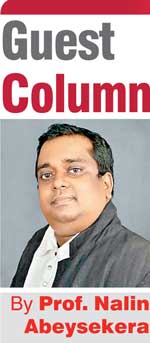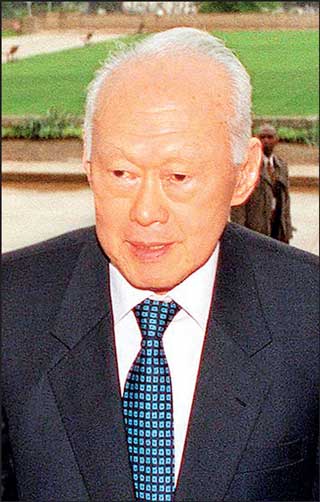Monday Feb 23, 2026
Monday Feb 23, 2026
Wednesday, 11 May 2022 00:05 - - {{hitsCtrl.values.hits}}
Recently I was really delighted to read the article published by Praying Mantis in ‘The Island’ under the title of “Need of the hour for Sri Lanka: The ‘MPH’ Formula of Singapore”. It is really interesting and fascinating to analyse the factors of Meritocracy, Pragmatism and Honesty (MPH) and we will see how Sri Lanka can implement this in our context.
fascinating to analyse the factors of Meritocracy, Pragmatism and Honesty (MPH) and we will see how Sri Lanka can implement this in our context.
We should read this MPH which is introduced by Dr. Goh Keng Swee (architect of Singapore’s economic miracle) and S. Rajaratnam (Singapore’s philosopher par excellence). As Sri Lanka is in a real crisis situation, we need to see different strategies and we should read more on best practices. Let us discuss this magical formula aligned with the Sri Lankan context.
Meritocracy
Meritocracy means a country picks its best citizens, not the relatives of the ruling class, to run a country. In a broader perspective, there should be a mechanism for selecting people on merit rather than class, privilege, or wealth. This should be applicable to the ministers, government as well as in other sectors in Sri Lanka. If you appoint your relative as your successor just because of the relationship in the institute that also needs to be considered in this context.
In Sri Lanka, there should be an apex body to consider the appointment of ministers and heads of institutions in the government and the duty of them is to make sure that the section of ministers and heads of institutions are made with their competencies (not with class, privilege, or wealth). Prior to the section the proposed ministers/administrators should be audited and all of them need to submit their asset declarations, etc. That also comes under the purview of ‘apex body’.
 |
| Singapore former Prime Minister late Lee Kuan Yew |
Pragmatism
As per Mahbubani (2017), “Pragmatism means that a country does not try to reinvent the wheel.” The above remarks of Kishore Mahbubani clearly indicate the real application of pragmatism. As Dr. Goh Keng Swee would say to me, “Kishore, no matter what problem Singapore encounters, somebody,
somewhere, has solved it. Let us copy the solution and adapt it to Singapore. Copying best practices is something any country can do.”
In Sri Lanka, we can see the education, social and cultural systems of the country mostly align with dogmatic ideology. Anyway, there is a need to change and adjust yourself (and organisations) by looking at the environment. This can be more seen in State-run institutions. All stakeholders (management, employees, trade union, and customers) should come together and make certain changes for this. It can be proposed to have ‘Consultative committees’ in State-run institutions with a combination of stakeholders and experts from the private sector.
It is worth noting that some private sector companies in Sri Lanka also have this same ‘Dogmatism syndrome’. We need to have transformational leaders with intellectual stimulation in which you challenge yourself as well as things around you. You always ask yourself how you can change the world for happiness. I think the other aspects of transformational leadership such as idealised influence (charisma, self-confidence, consistency and trust), and inspiration motivation (inspire confidence, motivation, and a sense of purpose in followers) are also important to have better pragmatism.
Honesty
This is always aligned with unethical activities such as corruption. I believe the religious leaders of the country should take initiative and act as the main influencing group to inculcate a country with honesty. And also it is important to note that practicing ‘honesty’ is not only applicable to ‘politicians’, it is to all citizens in the country. Even this most debated ‘corruption’ is under SDG goals as well.
As per United Nations, “The 2030 Agenda for Sustainable Development, adopted by all United Nations Member States in 2015, provides a shared blueprint for peace and prosperity for people and the planet, now and into the future. At its heart are the 17 Sustainable Development Goals (SDGs), which are an urgent call for action by all countries – developed and developing – in a global partnership. They recognise that ending poverty and other deprivations must go hand-in-hand with strategies that improve health and education, reduce inequality and spur economic growth – all while tackling climate change and working to preserve our oceans and forests.”
The 17 SDGs are: (1) No Poverty, (2) Zero Hunger, (3) Good Health and Well-being, (4) Quality Education, (5) Gender Equality, (6) Clean Water and Sanitation, (7) Affordable and Clean Energy, (8) Decent Work and Economic Growth, (9) Industry, Innovation and Infrastructure, (10) Reducing Inequality, (11) Sustainable Cities and Communities, (12) Responsible Consumption and Production, (13) Climate Action, (14) Life Below Water, (15) Life On Land, (16) Peace, Justice, and Strong Institutions, (17) Partnerships for the Goals.
More importantly under SDG 16 ‘Peace, Justice, and Strong Institutions’, fighting corruption is really important. To ensure the 2030 agenda there should be a special consideration for this factor of ‘corruption’ unless this will destabilise the progress of all SDGs.
Conclusion
As Sri Lankans, the time comes for all of us to have our own reflections. And everybody in the country needs to ‘change’ with a common vision. If one argues we need to have a better system, it is only half of the solution as there should be ‘responsible citizens’ to articulate that system. The people of the country also should be changed. So this ‘secret’ formula of MPH is one prescribed formula that is applicable to the country. And also we need to be ‘pragmatic’ to accept the good practices with localisation.
(The writer is a Professor in Management Studies, Faculty of Management, Management Studies, The Open University of Sri Lanka. He can be reached at [email protected].)